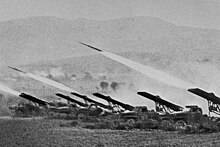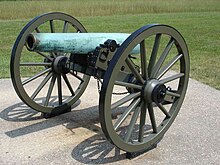Artillery
long-ranged guns for land and sea warfare
Artillery (from French artillerie) refers to any engine used for the discharge of projectiles during war. The term also describes ground-based troops with the primary function of manning such weapons.

You can go where you please, you can skid up the trees, but you don't get away from the guns! ~ Rudyard Kipling


Our wives are our loaded cannons, that's what our wives are.




From lips that 'aven't drunk all day: "The Guns! Thank Gawd, the Guns!" ~ Rudyard Kipling

Quotes
edit- Солдатушки, бравы ребятушки, а кто ваши жёны?
Наши жёны — пушки заряжёны, вот кто наши жёны.- Soldiers, you brave guys, who are your wives?
Our wives are our loaded cannons, that's what our wives are. - «Солдатушки, браво-ребятушки...», stanza 3, from «Сборник избранных песен для солдатского хорового пения» (Екатеринослав, 1893), reported in Н. Розанов, «Русские песни» (1952), p. 33
- Soldiers, you brave guys, who are your wives?
- We looked at each other, and back across the river. There were explosions in the town itself now; the first Fascist shells were landing in the city and there was the smoke of fires. From directly over our heads, on the crest of the hill, there came swift, violent reply that deafened us and we dropped onto the ground. Our own artillery was answering. "Nice to know we got a couple pop-guns of our own," I said. "This is no place to be," said Luke. "They'll be throwing the stuff over here in a minute."
- Alvah Bessie, Men in Battle: A Story of American in Spain (1939), p. 127
- From somewhere the enemy artillery awoke and the shells came over- you could count them as they came. And then you couldn't count them; they fell in no regular order, one-two-three, but with a conscious knowledge of where we were- to left, to right, ahead, behind, crashing like enormous garbage cans heaved by gigantic men. The broken earth fell on us, the cracked rock spattered against the unbroken stone of the hillsides. The growing night was loud in our ears, and the men, ordered up the right slope of the ravine, were huddled in a long line against the hillside, crouching, sitting, lying flat. My rifle was smashed to pieces in my hand.
- Alvah Bessie, Men in Battle: A Story of American in Spain (1939), p. 252-253
- Ahead, muffled by distance, was the sound of artillery in the night- always more terrifying than it is by day, though less effective.
- Alvah Bessie, Men in Battle: A Story of American in Spain (1939), pp. 270-271
- In peace the cry is for mobility, in war for weight of shell.
- Lt Col Alan F. Brooke (later Field Marshal Lord Alanbrooke), The Evolution of Artillery in the Great War (1925)
- …если угодно знать, «Войну и мир» читал… Вот, действительно, книга. До самого конца прочитал — и с удовольствием. А почему? Потому что писал не обормот какой-нибудь, а артиллерийский офицер. У вас десятка? Вы со мной…
- …If you really want to know, I've read War and Peace. Now there's a book for you. Read it right through — and enjoyed it. Why? Because it wasn't written by any old scribbler but by an artillery officer. Have you drawn a ten? Right, you're my partner…
- Mikhail Bulgakov, The White Guard (1925), as translated by Michael Glenny (1971)
- When, after a three-day silence, our only six-inch battery was delivered fifty shells, this was reported by telephone immediately to all the regiments, all companies, and all the men sighed with joy and relief.
- Gen. Anton Denikin about Russian 4th Rifle Division action in the battle of Przemyśl, May 1915. Source: Головин H. H. Военные усилия России в Мировой войне. — Париж: Т-во объединённых издателей, 1939, т. 2, гл. 7
- Artillery is an arm equally formidable both in the offensive and defensive.
- Antoine-Henri Jomini, Summary of the Art of War (1838), article XLVI, as translated by W. P. Craighill (1862)
- Suddenly the fresh booming of cannon was heard. A two-story red brick building half a block down the street began to twist and buckle. With a shivering roar, it toppled and collapsed. Bricks flew in every direction. A rebel shell had made a direct hit. A lieutenant sprinted down the middle of the street, one hand on his clanking sword to keep it from tripping him. As he ran, he muttered, "That crazy, dumb Hindman! Shelling his own town!"
- Harold Keith, Rifles for Watie (1957), pp. 152-153
- An' as their firin' dies away the 'usky whisper runs
From lips that 'aven't drunk all day: "The Guns! Thank Gawd, the Guns!"- Rudyard Kipling, "Ubique", The Five Nations (1903)
- For you all love the screw-guns — the screw-guns they all love you!
So when we call round with a few guns, o' course you will know what to do — hoo! hoo!
Just send in your Chief an' surrender — it's worse if you fights or you runs:
You can go where you please, you can skid up the trees, but you don't get away from the guns!- Rudyard Kipling, "Screw-Guns", Departmental Ditties and Ballads and Barrack-Room Ballads (1919)
- The poorer the infantry, the more artillery it needs; the American infantry needs all it can get.
- French General Koechlin-Schwartz, speaking to U.S. General George S. Patton on two occasions. Reported in The Patton Papers, 1940–1945, ed. Martin Blumenson; George Smith Patton (Houghton Mifflin, 1972), pp. 520-521
- Our artillery... The Germans feared it almost more than anything we had.
- Ernie Pyle, Brave Men (1944)
- It was great pity, ...
This villainous saltpetre should be digg’d
Out of the bowels of the harmless earth,
Which many a good tall fellow had destroy’d
So cowardly.- William Shakespeare, Henry IV, Part 1, Act I, Scene 3
- The nimble gunner
With linstock now the devilish cannon touches.- William Shakespeare, Henry V, Act III, Prologue
- The cannons have their bowels full of wrath,
And ready mounted are they to spit forth
Their iron indignation ’gainst your walls.- William Shakespeare, King John, Act II, Scene 1
- What cannoneer begot this lusty blood?
He speaks plain cannon, fire, and smoke, and bounce.- William Shakespeare, King John, Act II, Scene 1
- I have seen the cannon,
When it hath blown his ranks into the air
And, like the devil, from his very arm
Puff’d his own brother.- William Shakespeare, Othello, Act III, Scene 4